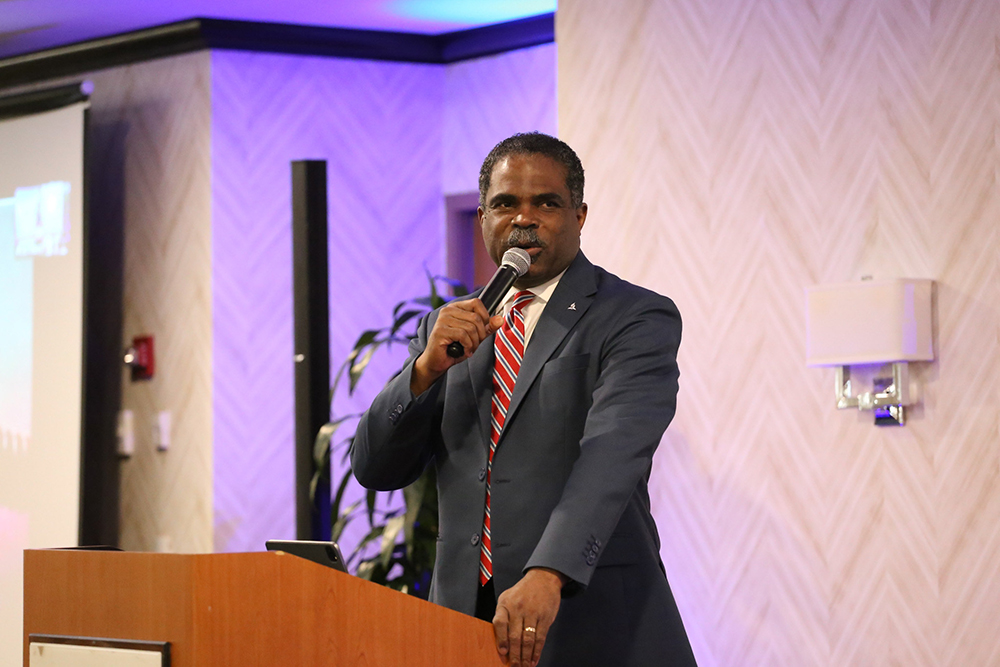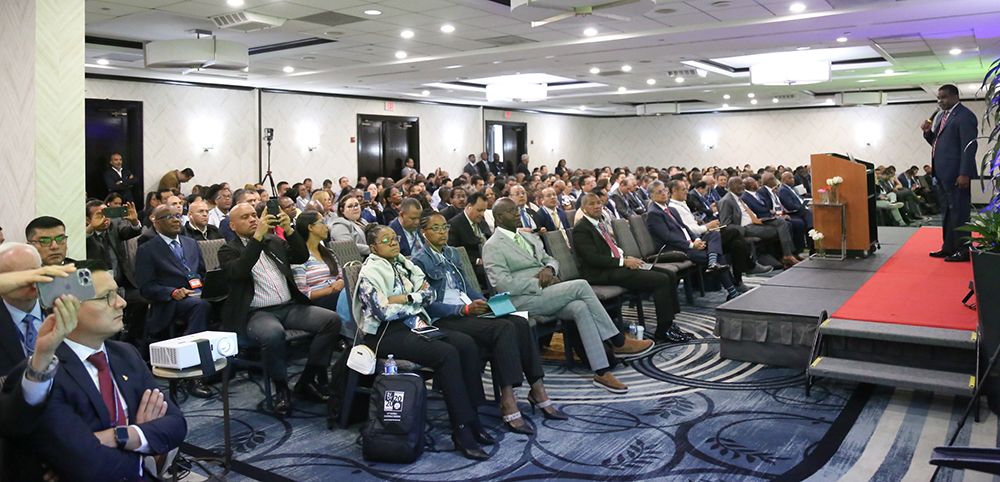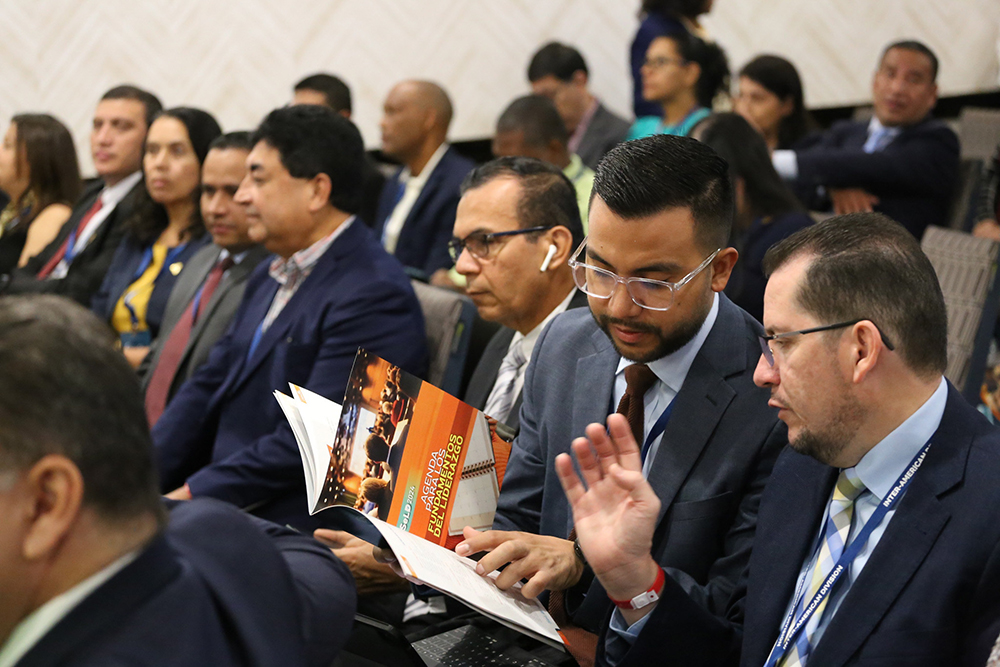Why the Adventist Church Has a Desperate Need of Missional Leaders
Presentation at the IAD SeLD conference zeroes in on key elements in church leadership.
July 25, 2024 | Miami, Florida, United States | Marcos Paseggi for Inter-American Division News
When talking about leadership, there are many kinds of leaders — servant, inclusive, transformational, authentic, empathetic, transparent, and visionary — but the greatest need of the Seventh-day Adventist Church is to have missional leaders.
This was the gist of a presentation during the second day of the Inter-American Division Segment of Leadership Development (SeLD) Conference in Miami, Florida, United States, July 23, 2024. The plenary session, led by General Conference Treasurer Pastor Paul H. Douglas, set out to explain what being a missional leader entails and its implications for the local church and church organization.

General Conference Treasurer Paul H. Douglas encourages the more than 1,300 Segment Leadership Development Conference delegates attending and connecting online, on July 23, 2024, to become focused missional leaders as they serve the Seventh-day Adventist Church throughout the Inter-American Division territory. [Photo: Libna Stevens/IAD]
A missional leader is “someone who is committed to a cause greater than themselves,” Douglas defined. It is someone who “embraces mission as the standard to which people and programs are to be aligned.” He added, “By promoting a personal relationship with God, the missional leader inspires people to work together as faithful stewards of mission.”
In that context, Douglas said that a missional leader is spiritual, strategic, synergistic, and a good steward. In the next few minutes, he set out to unpack those terms and lay out the implications for Seventh-day Adventist church leaders in Inter-America or elsewhere.
A Spiritual Leader
The missional leader should be a spiritual leader, emphasized Douglas, because “our relationship with God is foundational in all the things that we are and all the things that we do.” Thus, a missional leader has “a deep, personal relationship with Jesus,” he defined. “You cannot lead if you did not learn. You cannot lead if you haven’t sat at the feet of Jesus.”

Nearly 500 administrators, department directors, church pastors and elders listen in on day two of the SeLD Conference in Miami, Florida, United States. [Photo: Libna Stevens/IAD]
A Strategic Leader
A missional leader is also a strategic leader, suggested Douglas. A strategic leader asks questions to know where the organization — the local church, the conference, union, division, and even the General Conference — is, where it is going, and how it’s planning to get there, Pastor Douglas explained. They also ask what metrics, what outcomes will help the organization determine whether it’s made it.
A strategic leader “is always asking what’s next, anticipating what’s around the corner, what we should be doing, what we have done before that did not work…they should be asking these things,” he said.
Douglas explained the rationale for this process. “If we really believe that Jesus is coming soon, we should think and act differently,” he said. “There may be some things that we are doing that we should stop doing, and other things that we are not doing that we should start doing.” And all of that, he emphasized, with only purpose: “to build the Kingdom of God.”

Pastor Teófilo Silvestre, president of the Dominican Union, and his wife Orpha snap a photo during GC Treasurer Paul H. Douglas’ presentation on July 23, 2024. [Photo: Libna Stevens/IAD]
A missional leader is also a synergistic leader, said Douglas. According to him and in the context of the Adventist Church, synergy should be “a strategic tool to reduce cost, eliminate redundant processes, and avoid duplication of effort.” It is something, Pastor Douglas emphasized, that “will result in a greater utilization of resources for mission and the impact that can be realized by doing more together.”
On the other hand, a steward leader clearly understands that “Jesus Christ is the head of the church,” that “all authority has come from Jesus Christ Himself,” and that “God has used church members as family of believers to inspire them through the Spirit,” said Douglas said. Steward leaders “are perfectly aligned with the Master’s goals, and they receive from Him the power and authority to accomplish those goals,” he emphasized.
As a result, Douglas emphasized, this kind of leaders “demonstrate with attitude and actions their transparency and accountability.” A steward leader tells themselves, “It’s not my church; it’s God’s church. It’s not my conference; it’s God’s conference. It’s not my position; it’s God’s position. It’s not my presidency; it’s God’s presidency. It’s not my mission; it’s God’s mission,” Douglas said.
All of this is of paramount importance in the context of a declining church and institutions, Pastor Douglas acknowledged. Against that background, “what we need is missional leaders,” he said.

Two delegates look over the conference’s program agenda. [Photo: Libna Stevens/IAD]
Adventist leaders attending the 2024 SeLD conference were quick to point out the value of these discussions, and specifically, of Douglas’s presentation. One of them was Gustavo Menéndez, communication and personal ministries and Sabbath School director in the Guatemala Union.
“It has been an enriching experience to attend this SeLD conference and to be aware of the leadership challenges that we as a church face,” Menendez, who has served the Adventist Church for 33 years and was attending his 6th SeLD conference, said. According to him, being a spiritual leader focused on mission is a must if we want our church to move forward.
“As a church, we must pause to see where we are, where we are going, and how we are planning get there,” Menendez explained. “I was impressed by the urgency we have to make synergistic efforts, not isolated ones that do not impact the community. It is time for us to leave our personal agendas and align ourselves in a common front alongside the banner of Christ for the fulfillment of mission,” he said.